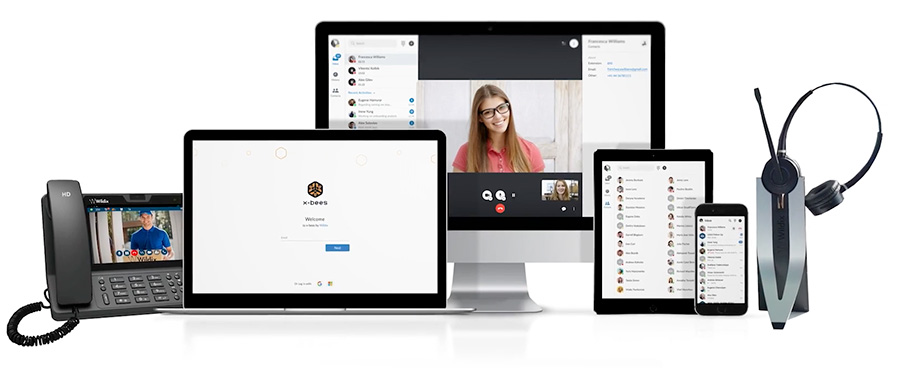Cloud Unified Communications
Keeping in Contact with Cloud Unified Communications
How using a Cloud-hosted PBX improves business operations
In today’s digital age, it is more feasible than ever for business operations to be conducted entirely online. Cloud technology, such as data collection and cloud computing, has allowed businesses to become highly efficient and easy to manage. However, one of the most valuable aspects of this technology is using the Cloud for unified communications.
With unified communications in the Cloud, companies can create a work schedule tailored towards their goals, increasing productivity while maintaining a more positive and cooperative work environment. Establishing a truly unified communications platform ensures that workflow and sales can progress in nearly any business situation.

Learn about the Future of Business Communications
Fill out the form to download the White Paper
“The Future of Communications”
“The Future of Communications”
There are three main benefits
in utilizing a Cloud-based unified communications system
Smart Working
Enabling workers to connect to their company communications system at any time and from anywhere for full work flexibility
Business Continuity
Ensuring that business operations can continue even in the event of outside disruptions
Scalability
Allowing for quick, convenient and cost-effective increase or decrease of the number of devices and/or licenses used by an organization
Let’s discuss these three benefits in further detail
Smart Working
Among the most well-known (and most beneficial) advantages of hosting a UCC system in the Cloud is the ability to allow employees to work anywhere, a model known as “smart working”. In previous years, smart working was considered by management to be just an added benefit of a cloud-based communications system, something that was a luxury rather than an outright business necessity. However, as a result of the COVID-19 pandemic, smart working became necessary to create a productive work environment.
This is because using Cloud-based unified communications enables workers to stay productive even when outside a typical office.The advantages of this model of flexible working are well documented: not only do 57% of remote-working employees have higher job satisfaction, but 78% of managers consider remote working the best non-monetary incentive for retaining talent.


The best way to maximize these advantages is by using the Cloud to set up a unified communications system. Through the Cloud, the PBX for any given UCC system and all its associated contacts become accessible from any location, rather than from only the physical or wireless connections allowed on site. In other words, using the Cloud means that employee phone numbers and other contact profiles can be used for communications on any device that can access the Cloud (such as laptops or smartphones).

It should be noted that the term “smart working” is separate from the more commonly used “remote working” or “working from home.” The latter two definitions tend to imply that an employee has the capability only to work from their home office, whether due to immovable equipment or location-based limitations of a company network. However, the model of smart working embraces full mobility.
By emphasizing connections that are not limited to a particular device or location, workers become able to collaborate with colleagues or reach out to customers from anywhere that’s most convenient for them, whether that location is home, a coffee shop, an airport or even a park with a stable mobile connection.
The difference is highlighted through greater flexibility and convenience for workers on the network. This model’s adaptability is further amplified by the possibility of a bring your device (BYOD) approach, where users can sign into work communications from their devices to continue working without their work-issued laptop or phone.
In this sense, smart working as enabled through Cloud-based unified communications grants workers full mobility and flexibility in their work, taking the benefits of the usual remote working to new heights. And since remote working has been consistently shown to result in 50% less employee turnover, 41% lower absenteeism and 21% increased company profitability, it’s safe to say smart working makes for an even more powerful investment for employee retention.
Business Continuity
An effective business should have the ability to continue its regular operations regardless of outside circumstances. Using the Cloud alongside unified communications systems is a compelling way to support business continuity, enabling reliable operations and sustained business success.
If COVID-19 has shown the world anything, it is how devastating uncontrollable circumstances can be to typical business operations. Although the most notable example of this is stay-at-home orders, other possibilities should be considered as well. Weather-related disasters such as floods or storms, pest infestations or even extensive construction can easily affect a business and make it unsuitable for business operations.
In all such cases, a business needs to have a backup means of continuity.
This backup is most easily provided through a Cloud-based unified communications solution. If a central workplace becomes inaccessible, a company’s PBX in the Cloud can effectively create a workplace that can be accessed elsewhere. Planning a transition to the Cloud is an undertaking, but, fortunately, it isn’t difficult when working with an effective Systems Integrator or Managed Service Provider for advice.

Once your UCC system is moved to the Cloud, it becomes far easier to access it from any location and device. Cloud-based unified communications increase the operational power and stability for such UCC capabilities as Voice over Internet Protocol (VoIP) and videoconferencing. Thanks to Cloud computing and a more extensive network reach, Cloud-based unified communications create greater mobility for end-users and, consequently, flexibility in utilizing this technology.

Rather than being tied to a physical PBX’s location and operation, unified communications in the Cloud effectively allow communication channels to be powered by any existing internet connection, regardless of whether it originates from a company’s main office building.
As a result, using the Cloud for unified communications is crucial for business continuity. It allows a company communications system to function without the use of or upkeep on a physical PBX. Should a physical office become inaccessible due to outside circumstances, a Cloud-based unified communications system ensures that company communications can continue entirely uninterrupted.
Scalability
Implementing the Cloud to run unified communications allows for even more versatility beyond just location. Namely, it allows for fast and straightforward scaling of the number of active devices a company uses.
In traditional communication setups, administrators must be physically present to set up new telephony hardware or add laptops or smartphones to a company network. Mainly due to the platform being connected through physical wiring or limited to a specified network, new devices must be added on-site.
However, Cloud-based unified communication changes the nature of this setup entirely. Because the Cloud enables remote access to a company’s communications network, new users are added to the system remotely. This means that a system administrator can quickly add a new user as an authorized part of the company network without physically connecting the device in question. The software can likewise be installed and connected remotely, as the managed service provider can authorize licenses for the end-user to implement and instantly use on their device.

This convenience applies to removing users from a network as well. Should a company need to downsize or remove independent contractors from their communications system, Cloud-based unified communications enable systems integrators to delete the specified users from the network remotely, removing account access and any relevant contact information process.

Again, this procedure can be done without being physically present at the site allows for greater convenience for both the end-user business and the system administrator. Neither party has to arrange for a physical appearance to conduct the procedure. Furthermore, the nature of this remote scaling of users also fits neatly into the previously discussed benefits of smart work and business continuity. Allowing users to be added or removed from a system while the administrator is elsewhere reduces the need for a centralized office to hold employees.
These capabilities for flexibility and scalability become incredibly impactful when Cloud communication technologies are bought as a service, or on a month-to-month basis instead of through a single upfront fee. Purchased through a monthly subscription, hardware or software used to run communications requires less cash investment, potentially meaning that should the technology need to be upgraded or removed from the network, less total cash has been spent on them before being decommissioned.
The Cloud Service & Wildix
As a platform for unified communications, one especially effective option for applying these advantages of the Cloud is Wildix. As the first developer to utilize WebRTC technology to run UCC software directly in the browser, Wildix focuses primarily on designing and implementing communications tools to run in the Cloud and take direct advantage of all the benefits that architecture allows.
Thanks to a Cloud network powered by Amazon Web Services, Wildix establishes a highly stable and reliable Cloud-based unified communications system that reaches a total of 133 countries without the need for on-prem equipment or on-site installations.
Wildix hardware can be drop-shipped out to end-users as a traditional purchase or as a Service and can then be set up and provisioned entirely remotely by the MSP. Likewise, because Wildix software is designed to run completely on the browser (with no additional app downloads), software solutions can also be enabled by the MSP and then implemented by the end-user with little to no downtime during the process.
With a focus on pure Cloud implementation and enabling fully mobile smart working, the Wildix solution makes for a reliable, entirely scalable option for any enterprise.







